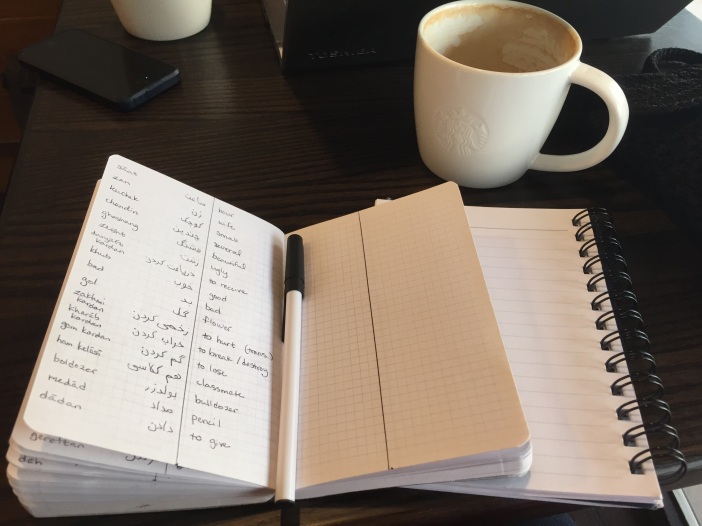I had a breakthrough while learning the vocabulary for this lesson. It happened when I got to the verb for “to lose” (gom kardan). Years ago, a friend taught me to tell people, “Gom shodam,” meaning, “I am lost.” Literally, it means “I became lost.” So when I saw the verb “gom kardan” it finally clicked that many, many verbs can be created with an adjective + “to become” (“shodan”) to create an intransitive verb, and an adjective + “to make” (“kardan”) to create a transitive verb.
It also makes verbs like “boland shodan” (“to stand up”) make so much more sense. The word “boland” means “tall” or “long,” so “boland shodan” or “to become tall” means “to stand up.” Of course. I knew all of this already, but that one verb suddenly made me stop and think about it. 🙂
The following sentences are from Easy Persian Useful Drills, Lesson 23:
- Your ugly dog hurt my beautiful cat this morning.
- That bad man stole my beautiful car last week.
- This bad neighbor broke my good computer last year.
- My good friend lost his big car 25 days ago.
- That short man built this big bridge 72 days ago.
- My short classmate bought a big dictionary 44 days ago.
- That big bulldozer destroyed our beautiful house 22 years ago.
- That tall man didn’t look at my small car.
- That ugly student broke my good pencil 19 days ago.
- This beautiful lady gave me a beautiful flower 16 weeks ago.
- That good man wrote this big book 82 years ago.
- My big cat didn’t kill her small mouse 101 days ago.
- My good dog didn’t hurt your small cat yesterday.
- I didn’t touch that big light the day before yesterday.
My translations:
۱. سگ زشتت امرور صبع گربه قشنگم را زخمی کرد.
۲. آن مرد بد هفته گزشته ماشین قشنگم را دزدید.
۳. این همسایه بد پار سال کامپیوتر خوبم را خراب کرد.
۴. دوست خوبم بیست و پنج روز پیش ماشین بزرگش را گم کرد.
۵. آن مرد قد کوتاه هفتاد و دو روز پیش این پل بزرگ را ساخت.
۶. هم کلاسی قد کوتاهم چهل و چهار روز پیش دیکشنری بزرگی را خرید.
۷. آن بولدزر بزرگ بیست و دو سال پیش خانه قشنگمان را خراب کرد.
۸. آن مرد قد بلند به ماشین کوچکم نگاه نکرد.
۹. آن دانش آموززشت نوزده روز پیش مداد خوبم را خراب کرد.
۱۰. این خانم قشنگ شانزده هفته پیش گل زیبایی را به من داد.
۱۱. آن مرد خوب هشتاد و دو سال پیش این کتاب بزرگ را نوشت.
۱۲. گربه بزرگم صد و یک روز پیش موش کوچکش را نکشت.
۱۳. سگ خوبم دیروز گربه کوچکت را زخمی نکرد.
۱۴. من پریروز به آن لامپ بزرگ را دست نزدم.
